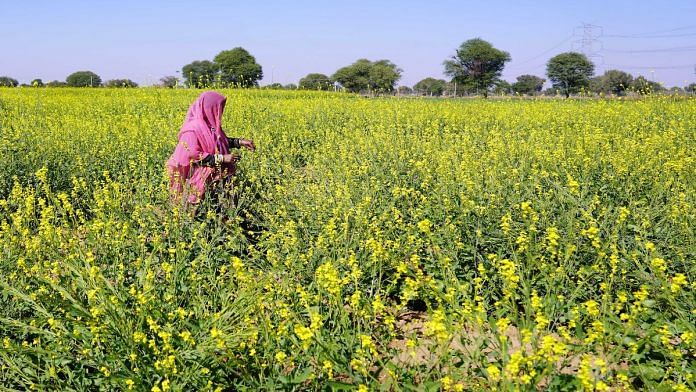New Delhi: Banning the commercial or public release of “genetically modified (GM)” crops will be “against national interest”, the central government told the Supreme Court in a written note Thursday. The note, which was a part of Solicitor General Tushar Mehta’s submissions, also revealed that there had been marginal increase in cultivation and production of mustard in India in the last decade.
With an increase in population, the consumption of oil in the country has gone up. To bridge the gap in supply and consumption, India is importing approximately 55 to 60 percent of edible oil to India, the note further added.
Defending the release of GM crops in India, the note showed that a total of 272.2 lakh hectares of area was under cultivation of oilseeds in 2010-11. This increased to 302.3 lakh hectares in 2022-23. However, the average per capita oil consumption has risen from 2.9 kg per year in 1950-60 to 19.50 kg per year in 2022, it said.
Strengthening of plant-breeding programmes, including the use of new technologies such as Genetic Engineering (GE) Technology, was critical for meeting emerging challenges in Indian agriculture and ensuring food security, while reducing foreign dependency, added the note. The use of new technology would increase farm productivity and income of farmers through development of low-input, high-output agriculture. This will make the country self-sufficient in edible oil and grain legumes, it said.
The note was placed before a bench of justices B.V. Nagarathna and Sanjay Karol, which last week commenced the hearing of two petitions against the release of GM crops in India. The petitions raised concern about the potential side-effects of GM crops in the long run.
In November 2022, the Centre had assured there would be no precipitative action from its end on the release of GM mustard. It was made in response to an application, filed by activist Aruna Rodrigues, seeking a moratorium on its release.
In August, 2023, however, the Centre filed an application for the withdrawal of its verbal undertaking given in November 2022 to not cultivate GM mustard.
The government pressed for an order on its application, when the bench last week decided to hear the matter and conclude it.
The bench Thursday reserved its judgement on the petitions. It observed verbally: “In our view, this cannot be an adversarial issue, but what is good for the country is good for the people.”
‘India importing, consuming large quantity of oil from GM oilseeds’
According to statistics mentioned in the note submitted Thursday, the total edible oil demand of India in 2020-21 was 24.6 million tonnes, with domestic availability of 11.1 million tonnes. The remaining 13.45 million tonnes, about 54 percent of the total demand, was met through imports worth Rs 1,15,000 crore, which includes palm oil (57 percent), soybean oil (22 percent), sunflower oil (15 percent) and a small quantity of canola-quality mustard oil.
In 2022-23, 155.33 lakh tonnes of the total edible oil demand was met through import. This quantity was more than 55 percent of the total requirement of edible oil in the country, the note added.
“India is importing and consuming a large quantity of edible oil from GM oilseeds. India imports about 55,000 MT [metric tonnes] of canola oil largely from GM canola seeds. Similarly, nearly 2.8 lakh tonnes of soybean oil is being imported annually largely comprising GM soybean oil. Most exporting countries such as Argentina, USA, Brazil and Canada cultivate GM soybeans. Globally around 80 percent of soybean growing is GM soybean,” the note explained.
During the hearing Thursday, Mehta pointed out that the country’s annual economic losses of crops due to weeds were $11 billion, that is Rs 1 lakh crore and that the annual value of herbicide currently used in India was Rs 4,500 crore even without HT (Herbicide Tolerant) crops.
He said HT crops provided effective weed control and it would be detrimental to ban development of HT crops for Indian agriculture as labour was expensive and not available.
The issue at hand, he said, required the court to decide between allegations of impact on the environment, which, according to him, were based on old half-baked studies and competing fundamental right of citizens to get very basic food used in their daily life – which is edible oil at the prices they can afford.
(Edited by Tikli Basu)
Also read: India’s corn exports plunge as local prices rally on strong demand



